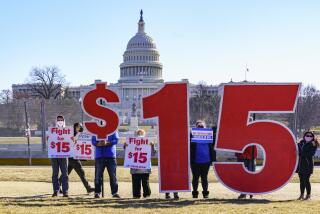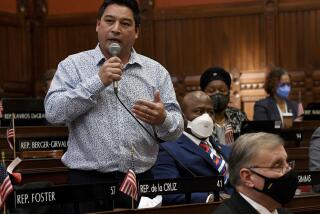It’s Time to Try Again
- Share via
Battered but resilient, the Democratic and Republican leaders of the House are preparing to call for another vote to approve pay raises for members of Congress and certain other federal officials. This takes no small political courage, given the working over Congress suffered earlier this year at the hands of an organized anti-pay- raise lobby. But the House leadership is displaying more than bravery as it prepares to face renewed wrath. It is also acting realistically and responsibly.
For when all the shouting is over, this fact remains: In a competitive marketplace, federal judges and other high-level officials are underpaid. The overdue effort to raise federal pay deserves not demagogic condemnation but public support.
No one argues that public service need be as remunerative as the private sector, but at the same time it’s absurd to ask those who go into public service to accept severe economic penalties. Current top pay for Congress and federal officials and judges is $89,500. Measured against average family income, measured, indeed, against the realistic aspirations of most wage earners, that’s a lot of money. It is not a lot, however, given what talented people in federal service could earn in the private sector. There are probably very few federal judges, assistant secretaries or senior civil servants who couldn’t expect to double or even triple their pay by opting out of public life.
And Congress? The argument for raising congressional pay is not so much a matter of equity as of ethical practicality. To augment their salaries members of Congress have for years left themselves free to solicit and accept outside income, $26,850 annually in the case of representatives, $35,000 for senators. Where does this money come from? In almost every case, it comes from people or organizations that are eager to curry favor or buy influence. This is demeaning, corrupting and scandalous, a taxpayer-robbing abuse of public trust that has long cried out for elimination.
The measure being prepared for a House vote would junk so-called honorariums--never was a word so misapplied--as well as sharply restrict outside income and fees for professional services. In exchange, top federal officials would get a two-tier pay raise to about $120,500 in 1991. The exact scope of the proposed ban isn’t yet clear. It may be that a toughening beyond what is contemplated will be required. What is known is that a pay increase for senior federal officials is overdue, and so is a far stricter ethical system governing outside congressional income. The chance to deal responsibly with both these questions is again at hand.
More to Read
Get the L.A. Times Politics newsletter
Deeply reported insights into legislation, politics and policy from Sacramento, Washington and beyond. In your inbox twice per week.
You may occasionally receive promotional content from the Los Angeles Times.










